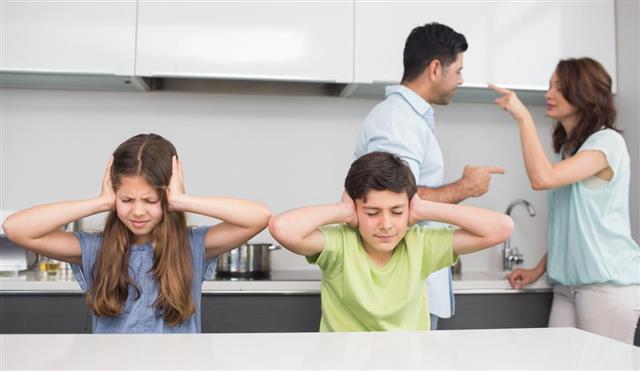What defines verbal abuse between a married couple? Is it about screaming, hurling expletives, or subtly bearing down using honey-coated insults? Let's find out.
No one expects their marriage to turn ugly, but the sad reality for many is that it does. For some, it may even turn fatal. Spousal or domestic abuse can perpetuate beyond sexual or physical abuse to a much more subtle form, i.e., verbal abuse.
Those who have experienced it say it is the worst form of abuse, for it leaves behind no physical scar, yet manages to scar an individual’s mind and soul. Unlike other forms of abuse, it comes without a loud sound.
Verbal Abuse
In marriage, verbal abuse is not about a harsh word spoken in a fit of anger or even an insult thrown offhandedly. It is the systematic use of language in an abusive manner, specifically used to make the spouse feel inferior, insecure, and run down. It also includes the written form.
As there is no universally accepted definition of verbal abuse, any form of communication done with the intent of causing harm to the person being spoken to. It may consist of language which is demeaning, name calling, shouting, derogatory remarks, insulting, intimidating, and threatening.
It is one of the most difficult forms of abuse when it comes to assessing emotional damage being inflicted on the victim. As it is subtle, even if shouting is included, it takes a long time for the victim to realize that they are being abused.
The period between getting verbally attacked until its realization is full of trauma and uncertainty as to why one is being put through it. As it not always comes with physical violence, the victim is mostly in denial.
However, with time, the perpetrator is emboldened by the victim’s non-retaliatory behavior, thereby increasing the intensity of verbal abuse, finally escalating to physical abuse.
For years, it was thought to be a gender issue, with the perpetrators being men and the victims women. Although the ratio of women being battered verbally and otherwise has always been higher, men too are being victimized. Domestic violence against women was highlighted in 1970 when woman’s rights and feminism was brought to fore.
Since the late 1970s, domestic violence against men has also gained significant attention. Hence, a verbally abusive marriage has now been brought under the blanket of domestic violence, where abuse can occur among spouses, against children, or intimate partners.
Why do people verbally abuse, how does one forget marriage vows of maintaining the spouse’s dignity and respect, how does one stop loving the other and think it is okay to cause emotional and mental trauma them? I am sure these are questions that most of us ask, especially if we know a victim or have been victimized ourselves.
Answers are not easy to come by, as there are a whole lot of sociological and ideological factors involved. As verbal or any other form of domestic violence is not gender, race, culture, or age-specific, it can happen to anyone at any social strata.
As dominance is part of many cultures, verbal abuse between married couples is more or less accepted. And being insidious in nature goes unrecognized, more so by the victim than the abuser.
Psychologists believe that those who themselves abuse or accept it have learned this pattern at home. At least 50% of the documented cases have an early history that consisted of receiving abuse themselves and/or seeing others being attacked in this fashion.
As a result, it becomes the normal way to live for them. Another reason that could also attribute towards the practice of verbal abuse is the need for control. As verbal abuse is intended to cause intimidation, insecurity, emotional trauma, and dependence, the perpetrator derives a sadistic pleasure in knowing that they yield power.
Mental or physical disorders are also reasons for this to occur. Individual’s suffering from anger management issues, narcissistic personality disorder, sociopathic or psychopathic tendencies may make one abuse the partner.
Substance abuse, or intermittent explosive behavioral disorders also may make one feel the need to leash out their uncontrollable temper and frustration on their spouse that sometimes goes beyond verbal abuse.
In all instances of this kind of attacks, the abusers believe that they are right to verbally put the spouse in place, as he/she asked for it.
Signs of Verbal Abuse
As said earlier, verbal abuse does not always come with visible signs, and it becomes difficult to demarcate a clear line between what constitutes it and what does not. It is the intentional use of language intended to hurt and demean the victim, and is not accidental at all.
The first sign is usually name calling, combined with screaming, cursing, shouting, and going ballistic for no or very trivial reason. However, some verbal abusers do it cleverly; they disguise their insults, ridicule, disrespect, and criticism by manipulating their words, especially when in public, but always get the message across to their partner.
Verbal abuse can also at times transcend from words to actions; actions that convey that one is unloved, unwanted, and can be conveniently ignored. The perpetrators always prey upon a dependent victim’s mind by using language that conveys threats of harm, or even leaving the family in a destitute condition.
A constant dismissal of opinions, feelings and use of threatening words are signs of abuse. The abuser also blames the victim for all the wrong decisions so that he/she starts doubting his/her own decision-making abilities. A verbal abuse also includes a language that makes one feel good, but manipulates one to submit to or accept undesirable behavior.
How to Deal With It
Recognizing abuse and accepting that one is being put through it is the first step to getting help for yourself. Stopping it is imperative, as in most cases where it occurs, it usually starts with a few odd sentences a day. In a short time, it escalates from threats to physical violence, which can prove fatal.
Although easier said than done, the victim needs to become proactive. Understand that there are individuals in your circle of family and friends who can lend a hand, or direct you to a support group.
Counseling and therapy is another way to deal with an abusive marriage. But, dealing with an abuser requires help that ensures that no bodily harm comes to you or your children (if any), when it is time to take your partner head on.
Although there are laws in the USA for domestic violence, verbal abuse only falls within its domain if violence is a part of it, as lack of a definition makes it inadmissible in court. Hence, it is important to take help of a support group and have backups in place, in case of an undesired eventuality.
Effects of verbal abuse can be devastating for a married couple, children, and the society. Abusive relationships are difficult to treat, especially if the perpetrator dose not believe that they are acting in a wrong way. Done over a prolonged duration with the intention to hurt, verbal abuse can traumatize and cripple an individual emotionally and mentally.
The victim will come to believe in their own unworthiness as projected by the perpetrator. Nothing could be more damaging to an individual’s spirit than being told they are not worthy. This damage will take years to heal, and whether you to live with it or stand up against it and be counted is ultimately going to be your choice.







